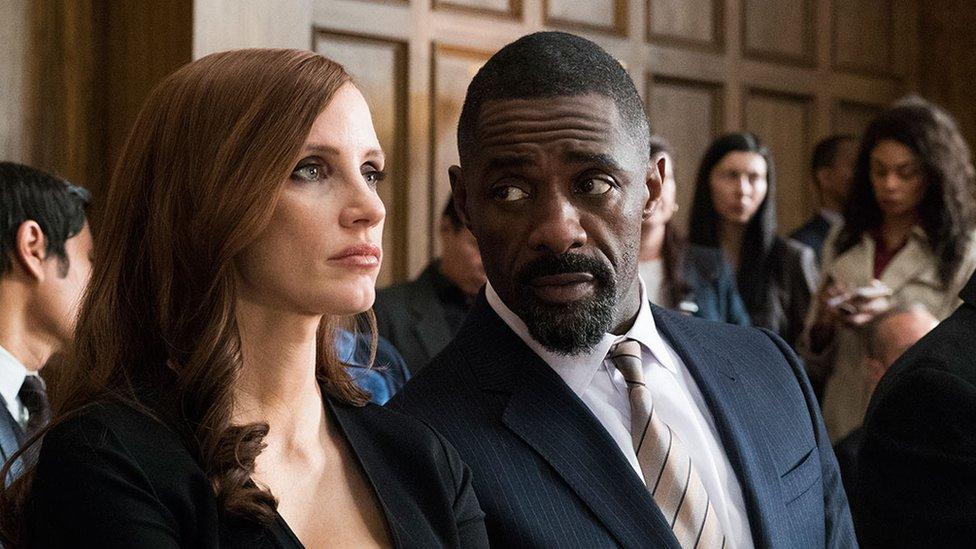The Trial of the Chicago 7: Will Gompertz reviews Aaron Sorkin's film★★★★☆
- Published
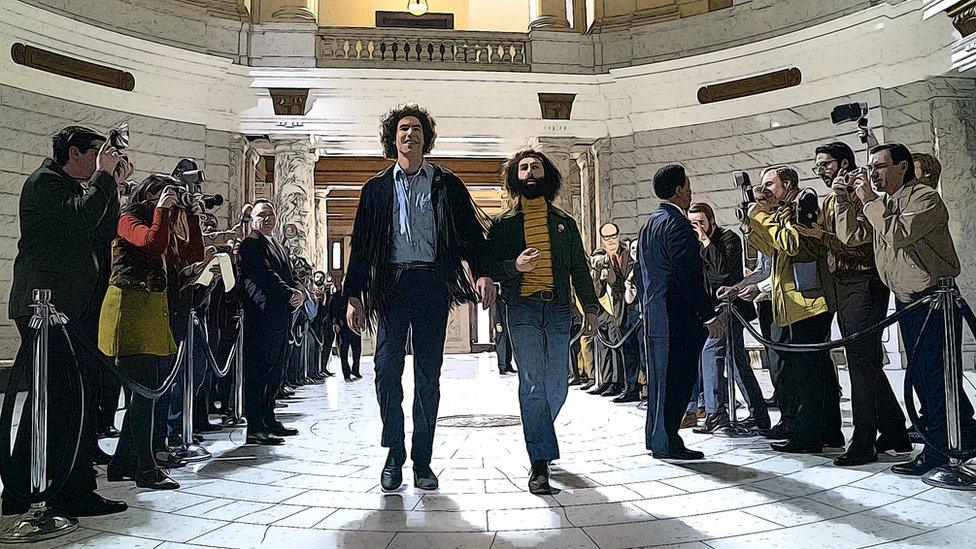
Aaron Sorkin is not someone who does things by halves. He is the man who turned a decade-long cocaine addiction into an eight-showers-a-day habit; who smashed his nose headbutting a mirror when rehearsing dialogue; who never uses one word when a fully-formed exposition consisting of a torrent of beautiful-crafted phrases is an option; and who, on the occasion of the second movie he has written and directed, didn't hire one star but an entire galaxy's worth.
The Trial of the Chicago 7 features a super-group of actors (Mark Rylance, Eddie Redmayne, Frank Langella, Sacha Baron Cohen, Michael Keaton) who Sorkin has moulded into a finely-tuned ensemble, each complementing the other like members of a chamber orchestra.
It's an impressive feat.
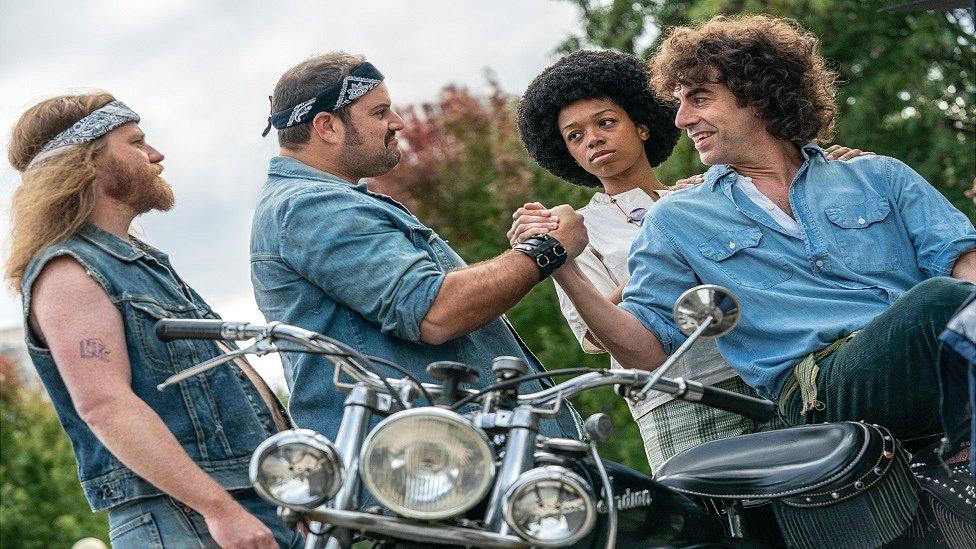
Sacha Baron Cohen (far right) as political activist Abbie Hoffman

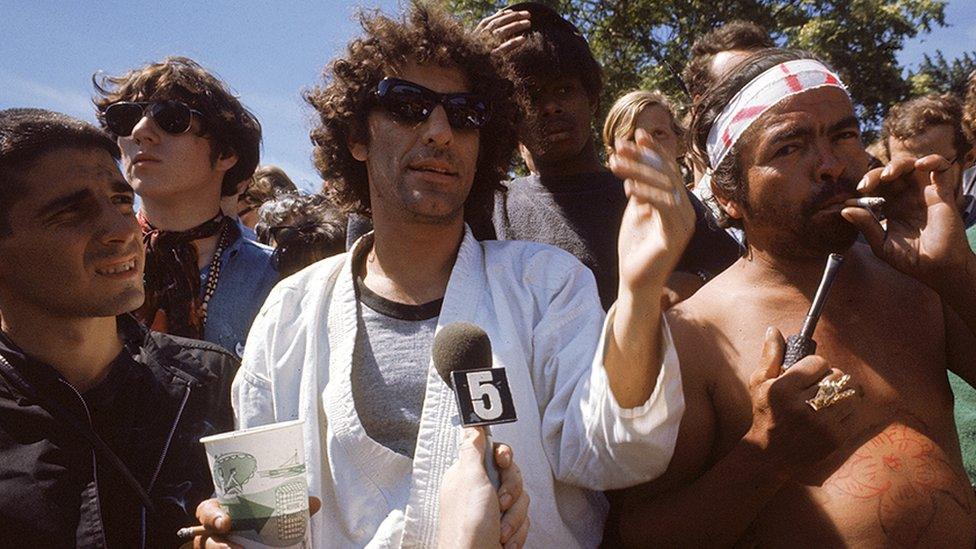
The real-life Abbie Hoffman with demonstrators in Grant Park, Chicago, protesting outside the Democratic National Convention in August 1968
Not because he has them all playing nicely together, which would be to suggest moderation for the greater good, but the opposite: he has elicited stand-out performances from each and every one.
All his stars get a chance to shine in a retelling of the notorious trial of a largely unrelated assortment of political activists who were collectively accused of inciting a riot at the 1968 Democratic National Convention in Chicago.
Mark Rylance is William Kunstler, their defence attorney, who was, from the little I know of his past, a larger-than-life courtroom presence. That's not how Rylance plays the lawyer, opting instead to characterise him as a wily intellectual feigning a low-status persona to generate sympathy and subvert authority in equal measure.

Kelvin Harrison Jr as Fred Hampton (leaning over) Yaha Abdul-Mateen II as Bobby Seale (l) and Mark Rylance as William Kunstler (r)
The authority in this instance is Judge Julius Hoffman (Frank Langella), a pompous, arrogant bully who uses his elevated position to enforce his bigoted views and dish out Contempt of Court orders as if they were freesheets on the subway.
He makes it crystal clear from the get-go that from his seat of impartiality he fully intends to oversee the incarceration of the accused and exoneration of the prosecution for justly pursuing a malicious conviction on behalf of President Nixon's government.
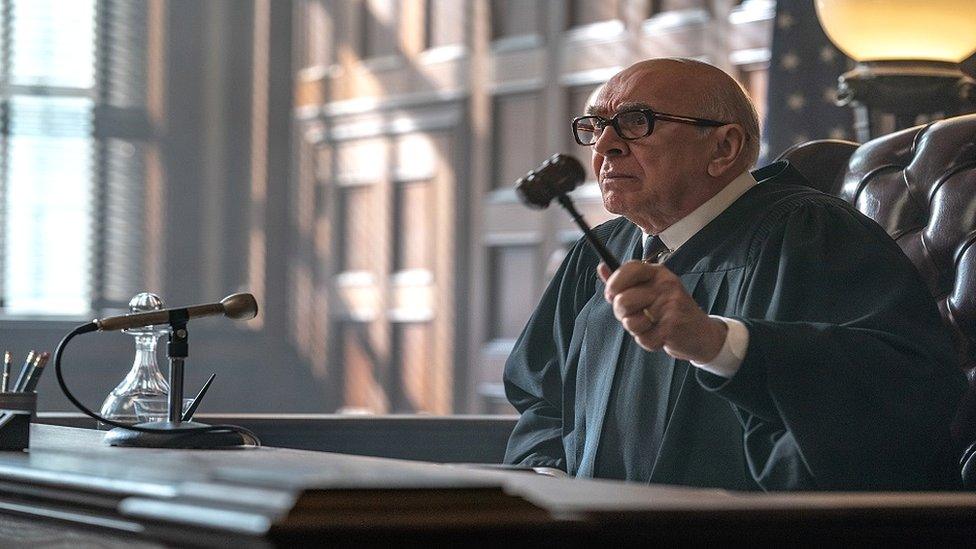
Frank Langella plays Judge Julius Hoffman
The trial is taking place at a troubled moment in America's history when the deeply divisive Vietnam War was raging, political assassinations were proliferating, racism was rife, and the country was being pulled apart by the profound philosophical differences between the left and the right.

Police moved against anti-Vietnam War protesters during the Democratic National Convention in Chicago in 1968
All of this Sorkin gets across in a packed opening that gives us the historical context, introduces protagonists, and sets the scene.
It would be a lot to get your head around if it wasn't a Sorkin movie, but it is, which means there's also his intense dialogue and constant movement to contend with - show and tell being his style.

Oscar-winner Aaron Sorkin both wrote and directed The Trial of the Chicago 7
It settles down when we enter the courtroom, allowing for a basic chronological structure to be imposed in which we discover what happened and why through a series of flashbacks. Characters and motivations are established, relationships are developed, and tension builds towards a bloody confrontation between police and protesters.
Meanwhile, back in court, the antagonistic dynamic between the accused on the liberal left, and the judge on the conservative right, evolves into a not-too-subtle reflection on the state of American politics today.
It's not a case of unconscious bias.
One of Sorkin's motivations for making the movie, having written a first draft of the script in 2006 for Steven Spielberg, was his dismay at Donald Trump winning the presidency in 2016.
That sense of a period piece speaking to our contemporary world can also be found in the presence of Bobby Seale (Yahya Abdul-Mateen II) among the accused. The Black Panther Party co-founder, against whom there is scant evidence, had no legal representation and is treated dismissively throughout. The scene in which he decides enough is enough doesn't so much resonate as chillingly demonstrate the ill-treatment young black men continue to endure simply because of the colour of their skin.
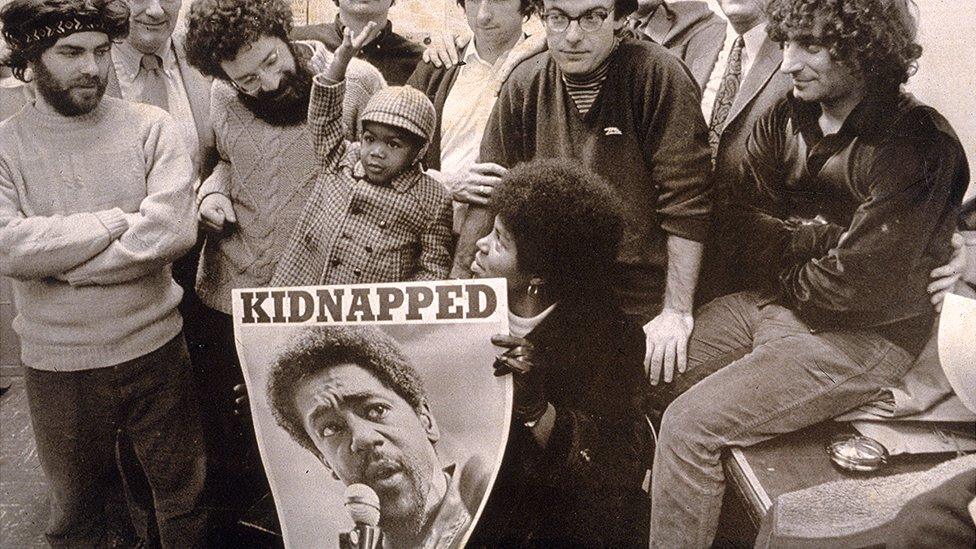
The real-life Chicago Seven holding a poster of Bobby Seale, who was charged with murder, kidnapping and conspiracy, and said "To be a Revolutionary is to be an Enemy of the State. To be arrested for this struggle is to be a Political Prisoner"
We all know Sorkin is one of the finest scriptwriters wielding a pen in Hollywood today (A Few Good Men, The West Wing, Moneyball, The Social Network), but his emergence as a director with a gift for handling actors is a revelation. He did a good job in Molly's Game, which he also wrote, but has taken a noticeable step forward with The Trial of the Chicago 7.
The wonderfully paced way in which he lets the relationship develop between Tom Hayden (Eddie Redmayne), a straight-laced political campaigner, and Abbie Hoffman (Sacha Baron Cohen) a radical left-wing activist, is a masterclass in letting actors act.
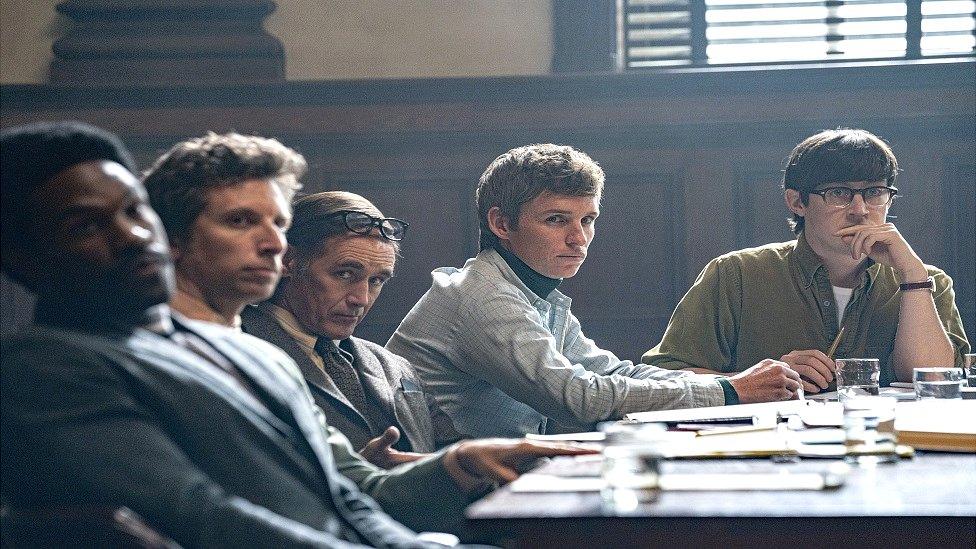
(L-R) Yaha Abdul-Mateen II as Bobby Seale, Ben Shenkman as Leonard Weinglass, Mark Rylance as William Kunstler, Eddie Redmayne as Tom Hayden and Alex Sharp as Rennie Davis
There's an ease, a naturalism to both performances, which allows them to find those tiny details that flesh out a character beyond a pen-portrait or recognisable impersonation.
They are very good.
As is the film, by and large.
There are moments of information overload, and others where it teeters on the brink of overbalancing - particularly in the latter stages - but as courtroom dramas go, it has reason to appeal.
Recent reviews by Will Gompertz:
Follow Will Gompertz on Twitter, external
Related topics
- Published9 September 2017
